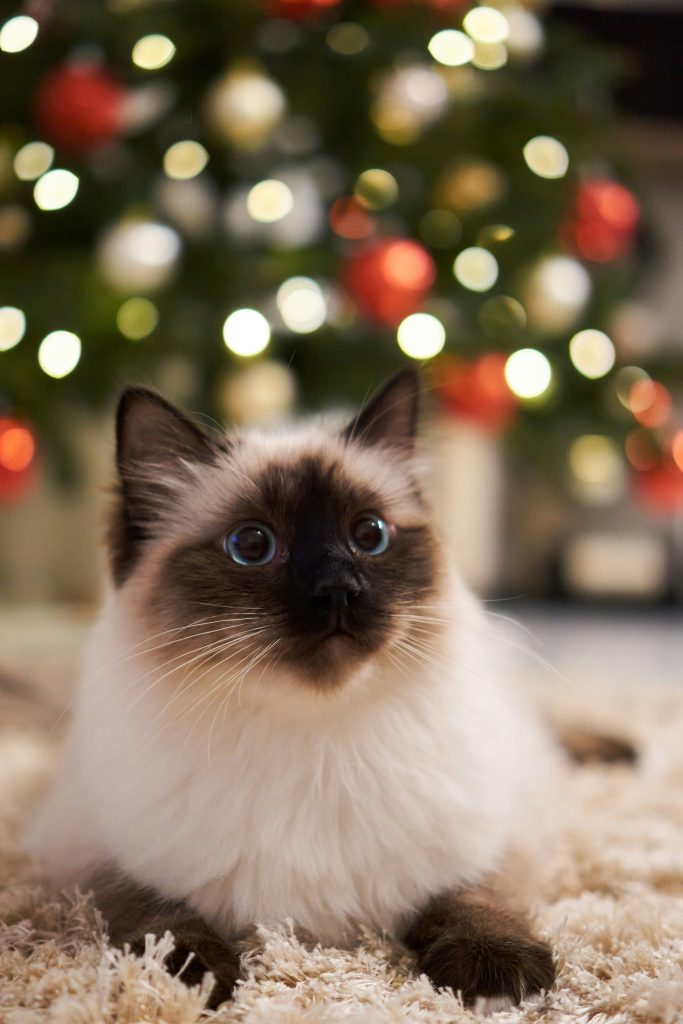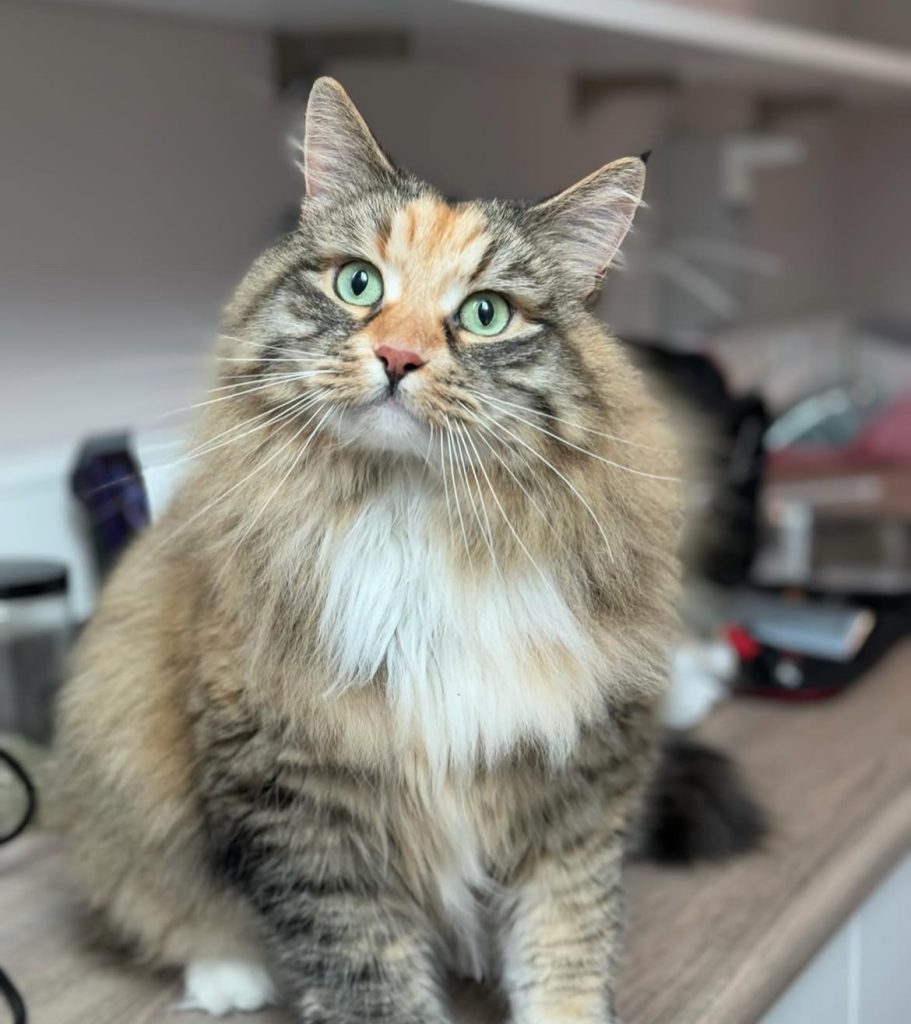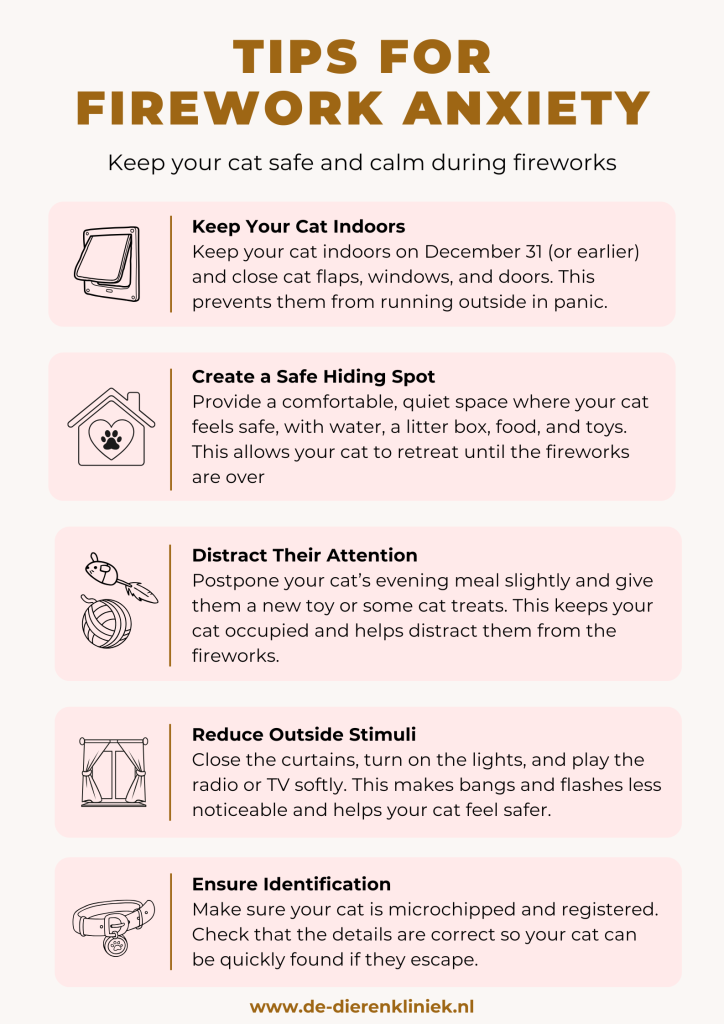How to Calm Your Cat During Fireworks

Christmas and New Year are for us a time of joy and excitement, filled with visitors, noise, music, presents, Christmas trees, and delicious smells. For many cats, however, this can be a period they’d rather skip. In particular, New Year’s Eve can be a stressful time for them.
Does your cat suffer from firework anxiety? Read on to find out how you can help your cat get through the holidays with as little stress as possible.
What is firework anxiety?
Firework anxiety is an oversensitivity to loud and unexpected noises, in this case the sound of fireworks. Some cats may not only react to fireworks but also to thunder, slamming doors, or other sudden loud sounds.
Cats with firework anxiety can become very stressed or frightened. They often associate the loud bangs and flashes of light with danger, which triggers their natural flight or hiding instincts.
Firework anxiety is more common than many people realize, and if left unaddressed, it can worsen each year. That’s why it’s important to recognize the signs early and prepare your cat properly for the holiday season.
How can you tell if your cat is afraid of fireworks?
Not every cat reacts the same way to loud noises, but there are clear signs that your cat may be scared. Pay special attention to changes in behavior around New Year’s Eve or whenever loud bangs are heard outside.
Common signs of firework anxiety in cats include:
- Hiding or seeking unusual places, such as under the bed, inside cupboards, or behind furniture.
- Trembling or restless movements.
- Low posture and/or tail tucked between the legs.
- Wide eyes and flattened ears.
- Excessive licking, grooming, or meowing without an obvious reason.
- Reduced appetite or avoiding the litter box entirely.
- Sudden aggression or startle responses to loud noises or flashes of light.
How can you help your cat?
Train your cat to get used to firework sounds
The best thing you can do is gradually accustom your cat to the sounds of fireworks. It may seem unnecessary for something that happens only once a year, but it can prevent a lot of anxiety—especially since firework anxiety often worsens as cats get older.
It’s best to start at a young age with sound training. You can use a firework CD or online audio clips, there are several videos available on YouTube specifically designed for pets. Start by playing the sound very quietly, so your cat doesn’t react, and interact with your cat by playing or cuddling at the same time. Gradually increase the volume in small steps, but never so loud that your cat gets scared.
If your cat shows signs of fear, you’ve gone too fast. Lower the volume and continue more slowly. Reward your cat afterward with a treat, so they associate the sound with something positive.
Short, regular sessions (for example, daily leading up to New Year’s Eve) help your cat eventually perceive firework sounds as normal.
Pheromones
Pheromones can help calm cats during stressful periods, such as around New Year’s Eve. These are natural chemical signals that cats produce themselves when they feel safe and relaxed. By artificially replicating these pheromones, your cat can feel more secure and at ease even in stressful situations at home.
A well-known product that can help is Feliway. It releases synthetic pheromones into your cat’s environment, providing a calming effect. It’s best to start using it about two weeks before New Year’s Eve, giving your cat enough time to get used to it and for the product to take effect.
Feliway is available in different forms, such as a plug-in diffuser for the room or a spray for specific areas in the house.
Supplements
In addition to behavioral training and pheromones, supplements can also help keep your cat calmer during stressful situations, such as fireworks. They support the nervous system and can reduce your cat’s stress response without causing drowsiness.
A well-known example is Zylkene, a nutritional supplement containing the active ingredient alpha-casozepine. This supplement has a calming effect and can help during stressful events such as moving house, long trips, staying in a cattery, or fireworks. Its effect is similar to Valium, but without making your cat sleepy.
Guidelines for use:
- Short-term stress: give 1-2 days beforehand.
- Long-term or anticipated stress: it may take 1-2 weeks to notice the effect.
- Firework anxiety in sensitive cats: ideally start 2-4 weeks before New Year’s Eve so the supplement is effective as soon as the first fireworks are set off, even if fireworks occur earlier.
Medication for Firework Anxiety
Sometimes medication may be necessary to support cats with severe firework anxiety. It’s important to know that not all sedatives are suitable for cats.
Recommended medications
Alprazolam
This medication belongs to the Valium family and primarily works to reduce anxiety, with fewer sedative effects. It can be given on the day of severe stress, for example during fireworks. Always give Alprazolam at the prescribed dose, and be cautious with cats that have liver or kidney issues. Some cats may be temporarily sleepy or less alert, but anxiety is generally reduced.
Gabapentin
Gabapentin is often used as an anxiety-reducing supplement for cats and can help reduce stress during fireworks. It works best when given 2–3 hours before the expected fireworks. Possible side effects include mild drowsiness or reduced coordination; these are normal and temporary.
To prescribe Alprazolam or Gabapentin, a veterinary consultation is legally required, so the safest and most effective medication and dosage can be determined for your cat.
Not recommended
Acepromazine (Vetranquil)
This medication can make cats more sensitive to loud noises. Although the cat may appear calm, they are unable to respond appropriately to fear (e.g., fleeing or trembling), and anxiety can even increase. For this reason, acepromazine is strongly discouraged.
Safety tips when using calming medication
When using calming medication, your cat may be temporarily wobbly or uncoordinated. It is important to keep your cat indoors and under supervision for at least 12 hours. Also, make sure your cat cannot jump from heights or injure themselves, for example from furniture or other elevated spots.
Tips for Cats Afraid of Fireworks
1. Keep your cat indoors in time
On December 31st (or preferably a day earlier), keep your cat indoors. This prevents your cat from panicking outside or running away. Make sure the cat flap is closed and all windows and doors are shut so your cat cannot escape during loud fireworks.
2. Create a safe hiding spot
This is perhaps the most important thing you can do for your cat during the holidays. Provide a comfortable, quiet, and safe place where your cat feels secure and protected, such as a box with a soft blanket, a bed under the furniture, or a quiet room where they won’t be disturbed.
Make sure your cat has everything they need in this space, including water, a litter box, a sleeping area, and optionally some food or a toy. This allows your cat to stay in their safe spot until the fireworks are over.
3. Distract your cat
Delay the evening meal slightly. A hungry cat is often more focused on eating than on outside noises. Offering a new toy or some treats can also help divert their attention from the fireworks.
4. Reduce external stimuli
Close the curtains, turn on the lights, and play the radio or TV quietly. This helps minimize the impact of loud noises and flashing lights from outside, making your cat feel safer.
5. Ensure identification
If your cat does get scared and escapes, it’s important that they are microchipped and properly registered. Only with correct registration can a lost cat be reunited with its owner. Make sure the chip information is up to date, so your cat can always safely return home
If you have any questions about this topic, please feel free to contact us. We wish you a happy holiday season!

Behavioural Advice
Would you like more information and advice about your cat’s behavior? Feel free to contactus, we’re happy to help!
Also interesting


